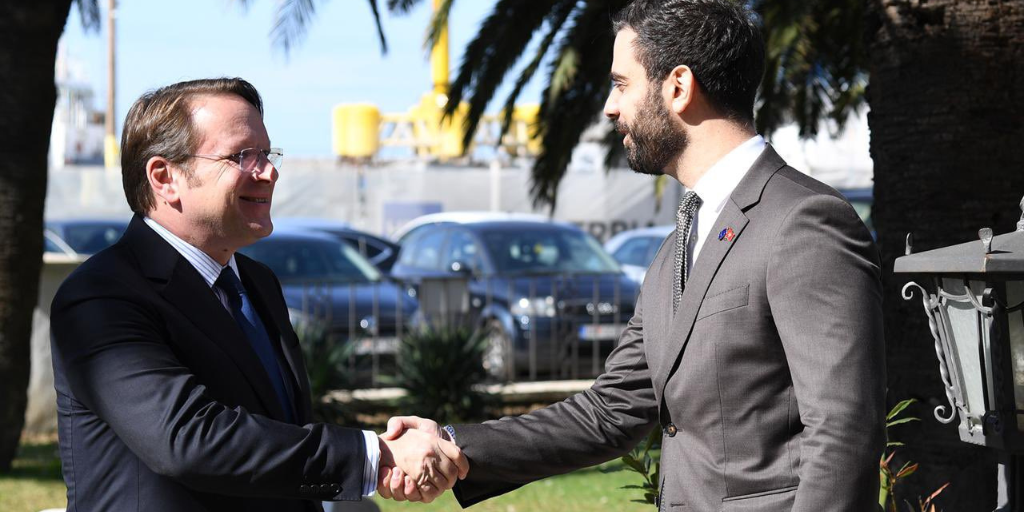Plans to build a fossil gas import terminal on Montenegro’s coast, with backing from the European Commission, endanger the country’s fossil fuel phaseout. Growing local opposition to the project also underlines poor public participation in the process.
Nataša Kovačević, District Heating Campaigner for the Western Balkans | 5 March 2024

Olivér Várhelyi, the EU Commissioner for Neighbourhood and Enlargement, meeting Filip Radulovic, Montenegro's Minister of Transportation and Maritime Affairs, in the city of Bar, February 28, 2024 (via https://twitter.com/OliverVarhelyi)
In recent months, a proposal for the construction of a liquified gas (LNG) terminal in the port town of Bar has ignited a fierce debate within the local community. In May 2023, the Montenegrin government signed a memorandum with US companies Enerflex Energy Systems and Wethington Energy Innovation to develop an LNG terminal and gas power plant, raising concerns about the potential adverse climate, environmental, and safety impacts for the local area and Montenegro as a whole.
The project has long been advanced without ever consulting neither the local authorities nor Bar residents. The first time members of the public get to have their say is in the public consultations on Montenegro’s draft 2040 Spatial Plan, which includes the LNG project and runs until 29 April.
Gasification from zero makes no sense
Although dependent on coal for around 40 per cent of electricity generation, Montenegro is not connected to international gas networks and consumes negligible amounts of the fuel. It also has a population of only around 620,000 and its electricity consumption is gradually declining due to the demise of its heavy industry. The Montenegrin government has already committed to phase out the use of fossil fuels by 2050. So, investing in fossil gas infrastructure would necessarily endanger climate goals and decarbonisation efforts.
The construction of the terminal and infrastructure itself would take five to ten years. With an operational life of maximum 15 years, dependence on imported gas, and the inevitable introduction of a more meaningful carbon pricing system in Montenegro, it is evident that the project cannot be financially feasible without massive public subsidies.
Local people fear for their safety
What worries local people most is the high risks of accidents and health and property damage, given that the project is planned in the most seismically active area of Montenegro, with an intensity of IX degrees on the MCS scale, only 500 metres from residential areas and close to warehouses of other dangerous chemicals. Their concern is substantiated by past accidents at LNG terminals, such as Skikda, Algeria (2004), when more than 20 people died and hundreds were injured.
Local authority seizes the initiative
The relevant local authorities hardly had any information about the government’s intentions so, on the 1st of February 2024, the Municipal Assembly of Bar held a public debate to discuss the ecological, economic, and social consequences of the project. Those present concluded that it is not in the public interest.
Moreover, on 16 February, the national Parliamentary Committee on Tourism, Agriculture, Ecology and Spatial Planning made a decision to hold a hearing involving the ministers of spatial planning; tourism; ecology, sustainable development, and northern development; internal affairs; and mining. The objective of this hearing is to investigate potential legal breaches in the public participation process, as well as failures to demonstrate the public interest and to disclose the environmental and social impacts of the proposed construction of the LNG terminal and associated gas projects.
These projects, valued at approximately a billion euros, with up to EUR 250 million designated for the terminal alone, have been advanced through international political agreements by government representatives without adequate national discussions on their economic viability. After a hearing in parliament, potential outcomes range from legislative and policy adjustments to excluding gas projects from policies and plans, accountability measures for government representatives, and monitoring the implementation of recommendations to address identified issues.
Counterproductive messages from the European Commission
The European Commission has long advocated for gasification in the Western Balkans, failing to understand that we are already deep in a climate emergency and the region cannot afford to undergo two energy transitions in the next two decades.
In October 2023, Enlargement Commissioner Oliver Varhelyi, made a troubling promise of EU financial support for the LNG terminal in Bar. In response, 27 Montenegrin civil society organizations urged the European Commission to shift its focus towards genuine transformational investments, such as energy efficiency and the development of sustainable renewable energy . However, the Commission’s response in December 2023 failed to acknowledge the unsustainability of an LNG terminal for Montenegro. This is a missed opportunity to prioritize energy transition and societal resilience.
No more space for fossil-fooling around – Montenegro must cut to a clean future
The debate over the proposed LNG terminal project in Bar, Montenegro, highlights critical concerns about its environmental, economic, and social impact. Montenegro’s commitment to phasing out fossil fuels by 2050, coupled with the financial and safety risks of the terminal, underscores the need to prioritize renewable energy sources and energy savings, for example by decreasing distribution network losses and using heat pumps instead of electric heaters. Only this way can Montenegro align with EU and global efforts to address climate change and ensure long-term environmental sustainability and economic stability.
Never miss an update
We expose the risks of international public finance and bring critical updates from the ground – straight to your inbox.
